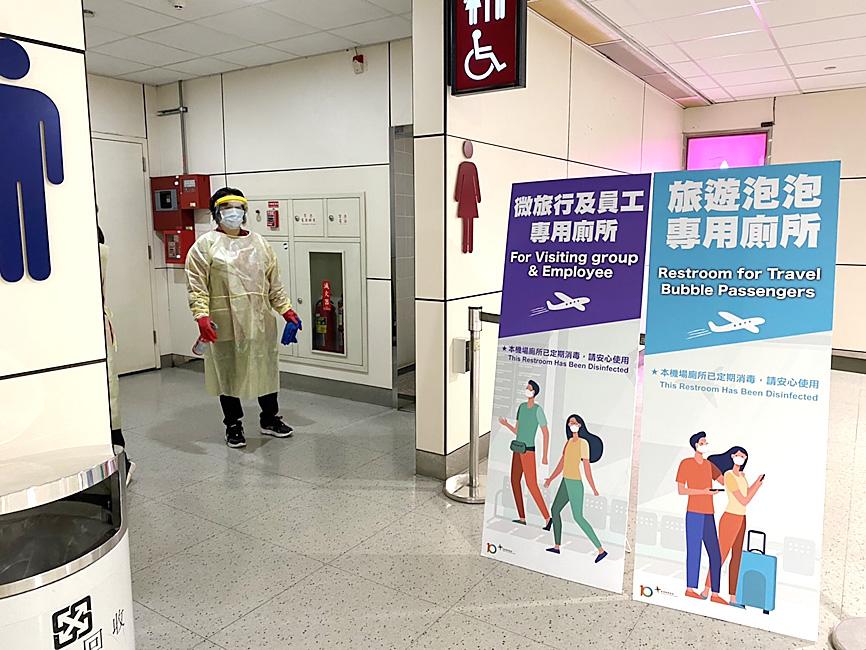The government is considering offering subsidies to Taiwanese visitors to Palau that would cover part of the polymerase chain reaction (PCR) testing fees, Minister of Transportation and Communications Wang Kwo-tsai (王國材) said yesterday.
Taiwan has been allowing people to travel to the Pacific island nation since April 1 via a “travel bubble” agreement between the two countries. While the pilot tours attracted more than 100 Taiwanese tourists, travel operators have since then reported lackluster sales of tours, which caused China Airlines to cancel charter flights to Palau.
One of the reasons for high tour prices is the PCR tests, which travelers are required to undertake both when they arrive at and return from Palau, Wang told reporters, adding that two PCR tests cost NT$10,000.

Photo: Hsiao Yu-hsin, Taipei Times
“Through the subsidies, we hope that tour prices would return to the pre-COVID-19 level, which would motivate more people to travel. The same subsidy program could also be implemented should Taiwan form travel bubbles with Singapore and Vietnam,” Wang said, adding that details of the subsidy program are still in discussion.
The ministry is also studying the possibility of subsidizing PCR tests for international tourists arriving via “travel bubble” agreements, as it would contribute to the growth of the nation’s tourism industry, which has been severely hit by the pandemic, Wang said.
Although the government is in talks with many nations and territories about forming travel corridors, Wang said that tours to Palau remain the ministry’s priority, as they would set an example for how a “travel bubble” agreement should be enforced in terms of arranging tours amid a pandemic.
“The experiences we gain from our opening tours to Palau would become an important point of reference when we discuss other ‘travel bubble’ agreements with the Central Epidemic Command Center,” he said, adding that the center would make the final decision on any other “travel bubble” agreements.
Starting on April 14, Taiwanese returning from Palau only need to observe general self-health management guidelines for 14 days, rather than undergoing a stricter version of self-health management for five days and general health management for another nine days, the Tourism Bureau has said.
Although tourists must still take a PCR test on the fifth day of their return, they are allowed to take public transport to work, it added.
Foreign expatriates in Taiwan who have Alien Permanent Resident Cards or Alien Resident Cards are allowed to travel to Palau through the “travel bubble” agreement as well, the bureau said.
On Monday, Singaporean Minister of Transport Ong Ye Kung (王乙康) said the city-state has submitted a “travel bubble” proposal to Taiwan, along with a proposed program to mutually recognize vaccination certificates.
In related news, the ministry is still studying whether the government should offer relief funds to workers in the travel industry in the second quarter of this year to compensate their loss of income due to the pandemic, Wang said.
The funds would be planned with a vision of boosting tours in the post-pandemic era and elevating overall travel quality, he said.

Taiwan is stepping up plans to create self-sufficient supply chains for combat drones and increase foreign orders from the US to counter China’s numerical superiority, a defense official said on Saturday. Commenting on condition of anonymity, the official said the nation’s armed forces are in agreement with US Admiral Samuel Paparo’s assessment that Taiwan’s military must be prepared to turn the nation’s waters into a “hellscape” for the Chinese People’s Liberation Army (PLA). Paparo, the commander of the US Indo-Pacific Command, reiterated the concept during a Congressional hearing in Washington on Wednesday. He first coined the term in a security conference last

Prosecutors today declined to say who was questioned regarding alleged forgery on petitions to recall Democratic Progressive Party (DPP) legislators, after Chinese-language media earlier reported that members of the Chinese Nationalist Party (KMT) Youth League were brought in for questioning. The Ministry of Justice Investigation Bureau confirmed that two people had been questioned, but did not disclose any further information about the ongoing investigation. KMT Youth League members Lee Hsiao-liang (李孝亮) and Liu Szu-yin (劉思吟) — who are leading the effort to recall DPP caucus chief executive Rosalia Wu (吳思瑤) and Legislator Wu Pei-yi (吳沛憶) — both posted on Facebook saying: “I

The Ministry of Economic Affairs has fined Taobao NT$1.2 million (US$36,912) for advertisements that exceed its approved business scope, requiring the Chinese e-commerce platform to make corrections in the first half of this year or its license may be revoked. Lawmakers have called for stricter enforcement of Chinese e-commerce platforms and measures to prevent China from laundering its goods through Taiwan in response to US President Donald Trump’s heavy tariffs on China. The Legislative Yuan’s Finance Committee met today to discuss policies to prevent China from dumping goods in Taiwan, inviting government agencies to report. Democratic Progressive Party Legislator Kuo Kuo-wen (郭國文) said

Sung Chien-liang (宋建樑), who led efforts to recall Democratic Progressive Party (DPP) Legislator Lee Kun-cheng (李坤城), was released on bail of NT$80,000 today amid outcry over his decision to wear a Nazi armband to questioning the night before. Sung arrived at the New Taipei District Prosecutors’ Office for questioning in a recall petition forgery case last night wearing a red armband bearing a swastika, carrying a copy of Adolf Hitler’s Mein Kampf and giving a Nazi salute. Sung left the building at 1:15am without the armband and covering the book with his coat. Lee said today that this is a serious